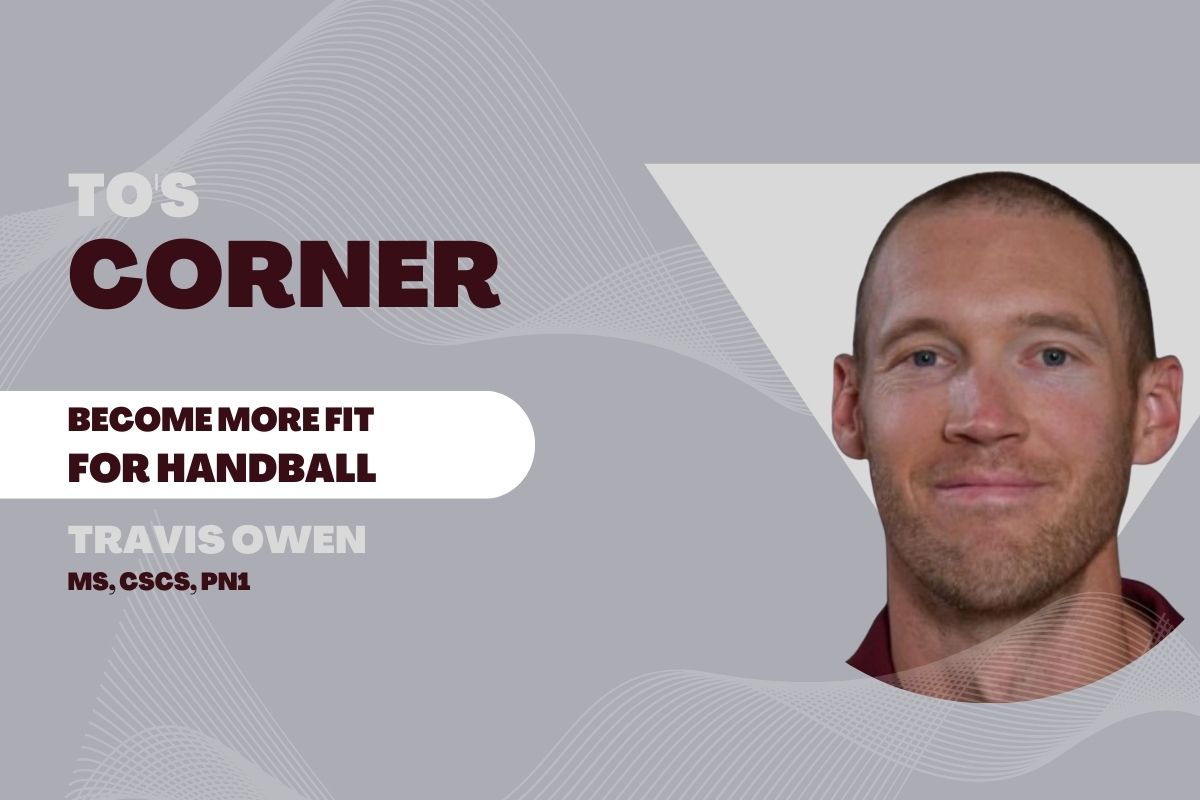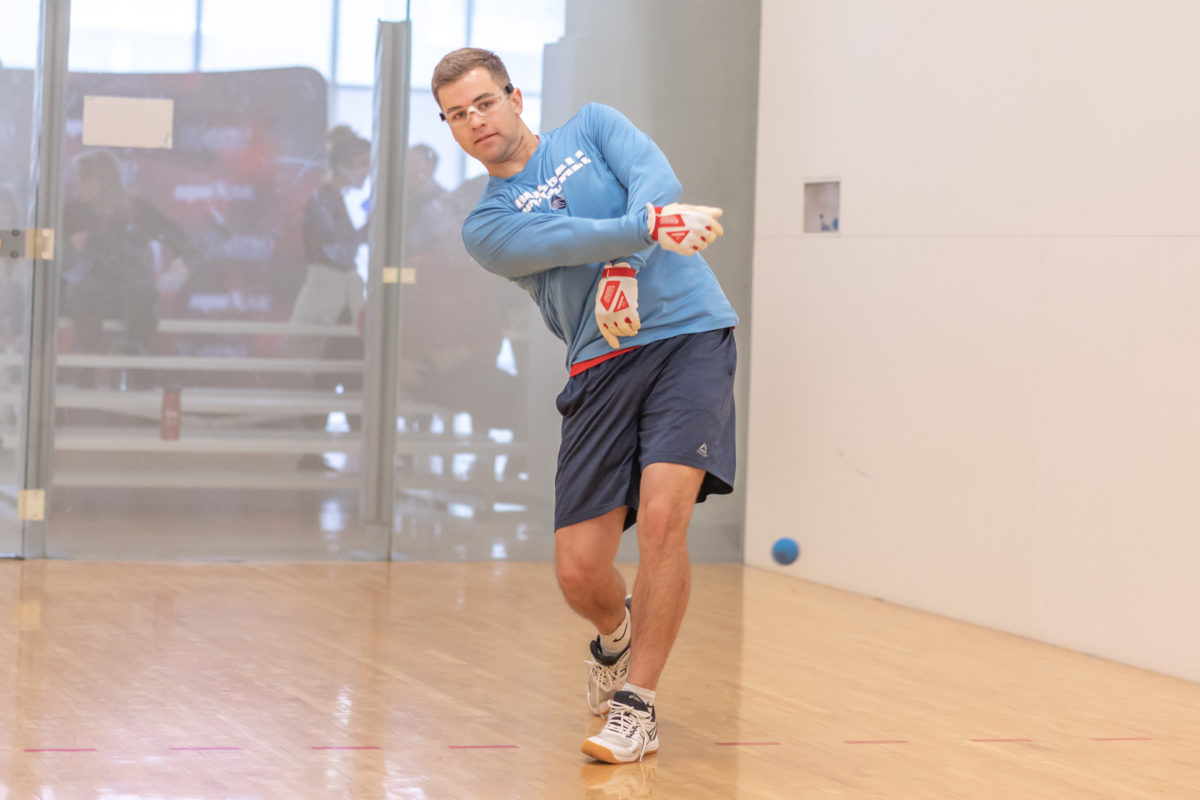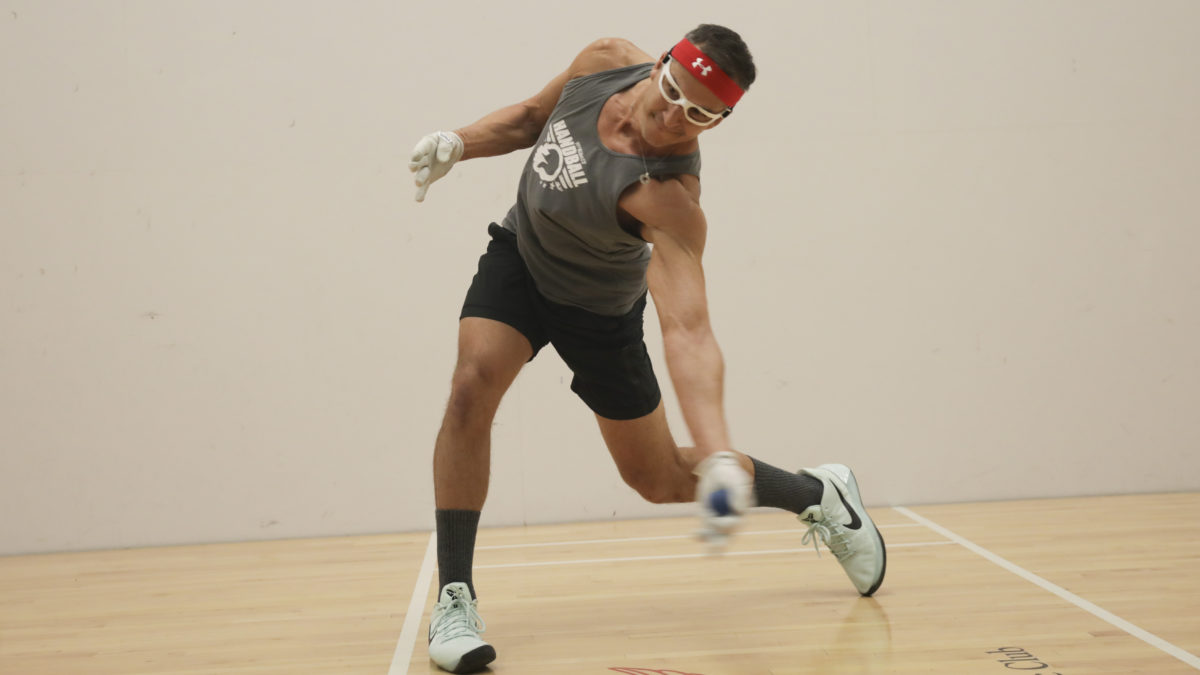T.O.’s Corner: Helping Handballers Become Fitter and Recover More Quickly
WPH Press, Tucson, AZ
By Travis Owen, MS, CSCS, PN1
After getting a glimpse into some of Sam Esser’s training, one of the young up-and-comers in the sport, I wanted to speak with both him, as well as the seasoned-veteran Dave Fink, about their training methods. Each of these players are about 20 years apart, with Dave still playing great ball in his mid-40’s, and Sam continuing to improve at a spry 26 years old.
Here are each of their interviews below, with some of my notes following both interviews:
T.O.: In what ways has your training changed, if at all, over the recent years?
Sam:
I didn’t really take handball seriously until college, and that’s when I began doing other training besides playing.
During handball season, which was more so the spring semester in college, I would run the stadium stairs two or three times a week and then lift three times a week. The stairs I would like to do before we had our handball practice, so I could learn to execute shots with tired legs.
After a surgery on my right shoulder near the end of my college career, I kind of stopped doing any lifting. Now my training is mostly just cardio, doing distance runs and sprints. I like to focus more on stretching now too, which I did basically none of in college.
T.O.: If you had no “barriers” whatsoever to training (i.e. could play any type of competition at any time of day…no job besides handball training, and access to any type of facility), what would your ideal routine be?
Sam:
The first exercise of the day would be some kind of stretching or yoga exercise to get the body loose. That would probably be followed by a cardio workout. I really think running stadium stairs has a lot of benefits for handball. I’d rotate days running stairs and distance running, followed by running sprints.
Playing Handball against a top tier player would be next. There is no better way to improve your game than playing somebody better than you. If I could play a guy like Killian who makes you really earn every point with his speed that would be ideal.
I’d end by lifting weights, and rotate days to work on different muscles. That would be followed by another yoga or stretching exercise.
T.O.: In a past article I read about you, you talked a lot about taking more time doing drills in the days leading up to tournaments, since it’s generally less taxing…do you have a general plan leading up to tournaments or is it more just getting a feel for what you want to work on the most?
Sam:
I like to rotate days of playing a hard, competitive handball match and drilling. There is always something you can be working on to improve your game. By playing a hard match Monday, I’m able to find out what I’m not doing well and drill on it Tuesday. Same strategy for Wednesday and Thursday.
If I start tournament play on Saturday, my week would like this:
Monday: Play hard match
Tuesday: Drill
Wednesday: Play hard match
Thursday: Drill
Friday: Rest day before tournament
Some of the drill days might be accompanied by a cardio workout.
T.O.: Do you treat 3-wall preparation different from 4-wall (besides the obvious just playing those variations) and in what ways if so?
Sam:
Other than playing 3-wall and working on the different shots that accompany that game, not really.
T.O.: I thought you may have mentioned eating better as tournaments approach, in your past article. Can you shed light on specifically how, if so?
Sam:
My wife, Mikaila Esser is a dietitian. I just do what I’m told by her!
T.O.: Do you focus on any type of nutrition during tournaments or heavy match days?
Sam:
I don’t eat breakfast on a normal day but make sure to do so on tournament days. I also don’t eat fruit much, but try to do more so during tournaments.
T.O.: Do you have any post-tournament recovery strategies?
Sam:
Stretching! Both during and after the tournament. I try to stretch after every match I play. I find that I play better late when I do so.
T.O.: Do you have a favorite type of training?
Sam:
Truthfully the only workout I enjoy is actually playing Handball or some other sport. I don’t really enjoy running, lifting or even stretching. It’s important to do though!
(Dave Fink)
T.O.: I know each week may be different, but how many times on average would you say you play, practice…do other types of training? And does that depend on where you’re at in the season?
Dave:
I aim for at least an hour of exercise every day, minimum. Whether playing handball, practicing and then lifting weights following, playing tennis, and so forth. I may take a day off now and then, like after a tourney, but ideally I try to shoot for 3 times / week lifting weights, 4 times per week cardio- which could be a hard handball or tennis match, but may also be sprints, agility, stationary biking… I used to jump rope but haven’t been doing that as much lately with a nagging hamstring issue.
T.O.: That’s an impressive amount of exercise volume. Have you added or changed anything over the years?
Dave:
I’ve actually started doing pilates every day, which is excruciatingly difficult. Over the years I had also added some agility and interval spring work. For example:
-5 sprints back wall to front wall, which takes around 10 seconds… then take a 10 second break.
-10 sprints back wall to front wall, which takes around 30 seconds…then a 20-25 second break.
-15 sprints back wall to front wall, taking around 40 seconds…and a 40 second break
-Finally 20 sprints, which take a minute or so.
T.O.: What about post tournament recovery?
Dave:
I like to do something the day after a tournament usually, some light active recovery to get the lactic acid out. Just moving the body around, possibly biking. I’ll also take some time away from handball after a hard tournament- usually around a week, which just seems to help mentally and physically.
T.O.: It sounds like you do a lot of listening to your body, but also still pushing it. Does your routine change as a tournament nears?
Dave:
I set goals, something like 9 matches in the 3 weeks prior to a big tournament- hard matches. Trying to find the best competition I can play to push myself and hopefully peak for a tournament. I may hit it around by myself as well, to practice, say 20-30 minutes, then lift weights for a half hour for example, which hits my hour of daily exercise.
T.O.: How has your training changed as you’ve gotten older?
Dave:
It’s been pretty consistent. I find some changes work better based on how many matches I play versus how much I practice myself. I’ve maintained the same type of formula which is lifting weights 3x per week, 2-3 handball matches per week, 2-3 tennis matches per week. Plus interval training.
T.O.: What sort of things are you doing that are the same from when you were younger?
Dave:
Working out has been ingrained in me since I was extremely young. I find ways to work around any injuries but push myself. I try to be very conscientious of what I eat- a balanced diet of protein/fats/carbs. Sleeping is big. Every athlete needs at least 8 hours of sleep each night. Ideally I want to get those 8 hours, eat good food, and exercise an hour every day.
T.O.: What mistakes would you say are made with training in general?
Dave:
I would definitely say like running at a stationary pace for a while…what would you call it?
T.O.: Like steady state cardio?
Dave:
Yes. You might as well add in some other movements, or make it interval training where you can be a bit more powerful.
I would also say it’s important to have the discipline to work out every day. It gives you the confidence that you’re not going to get tired. Right away I know if I can make the match into a grind, it gives me an advantage. Consistently working out, psychologically gives you a big edge. A huge advantage the Irish players have, everyone knows they’re not going to get tired. It makes your opponent press and push different shots (when he is tired), guys kind of change their game to shorten rallies, go for shots they couldn’t and shouldn’t go for. That conditioning plays a big part.
—————
These interviews were great to see both the similarities and differences in training methods. The bottom line is that every individual is different, when it comes to training needs. How to get to top physical peak isn’t the same for everyone.
Some interesting notes from my knowledge base in exercise and nutrition: Sam avoiding breakfast is actually a form of intermittent fasting. There is lots of interesting evidence on this and the jury is still out on what advantages/disadvantages there are, but again, everyone is different and what works well for some may not always work great for others. He mentioned avoiding this on tournament days (which would be wise since one is burning such a high amount of calories on tournament days, playing at the level Sam plays).
Dave has a high volume of training but has built that up over time by being incredibly consistent. He also certainly focuses on the things that one needs to, if putting in that much volume: Sleep, hydration, good nutrition. I guarantee if you took an average Joe and threw them into Dave’s routine, they would be incredibly sore for several days to a week following.
On that note, one tidbit Dave mentioned was that recently he had to take some time away from playing to let a nagging injury heal that had been taking a while, and he jumped right back into a tournament. He said when he started playing, his legs felt so wobbly and tired, like they’ve never felt before, due to the lack of recent playing. Sure he had been biking and doing other things to work around it, but wasn’t planting and cutting and swinging. This brings home a great point that you can’t mimic handball exactly without actually playing it. So to supplement playing, it’s important that the training around handball has a purpose. Whether it’s strength (both players mentioned lifting) to hopefully avoid injury due to stronger muscle fibers, conditioning, or mobility, all of these things are important aspects to aim for during a training session. And one final similarity both players mentioned is the importance of nutrition, which obviously helps get nutrients back into the body after training hard to aid in recovery.
Travis Owen is the founder of his training service Travis Owen Performance (T.O. Performance) and has been involved with handball since picking it up in college in 2005. CSCS Certified through the National Strength & Conditioning Association and having earned his Master’s degree in 2011, Travis has been training individuals of all types for over 10 years. With an initial focus on softball & baseball athletes, Travis is starting to expand his reach to handball players and would like to elevate the game by providing articles and videos, as well as program design or training for anyone interested.
Contact Travis by email at owenperformanceTO@gmail.com, or travisowenperformance.com














